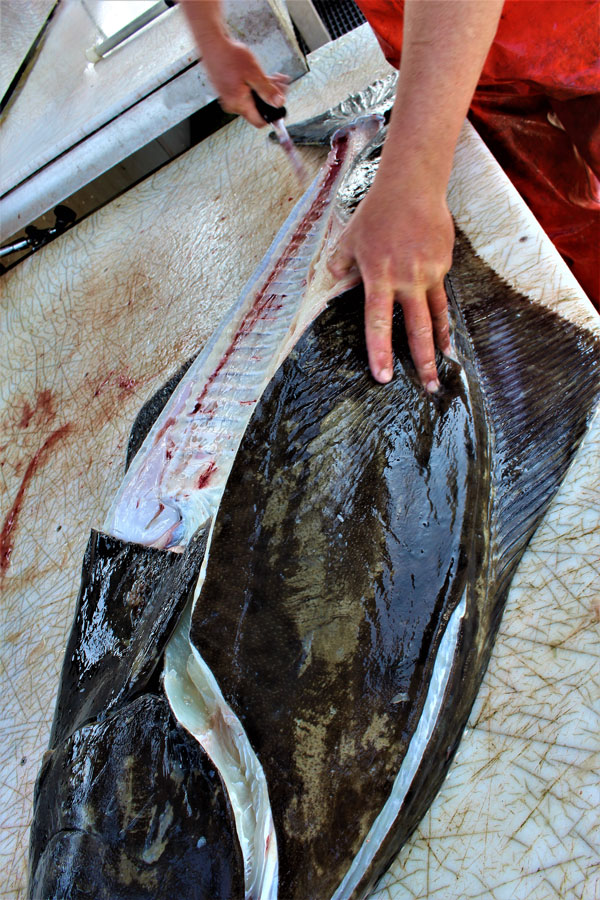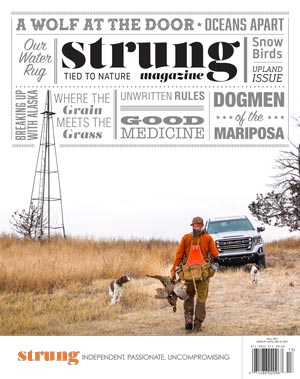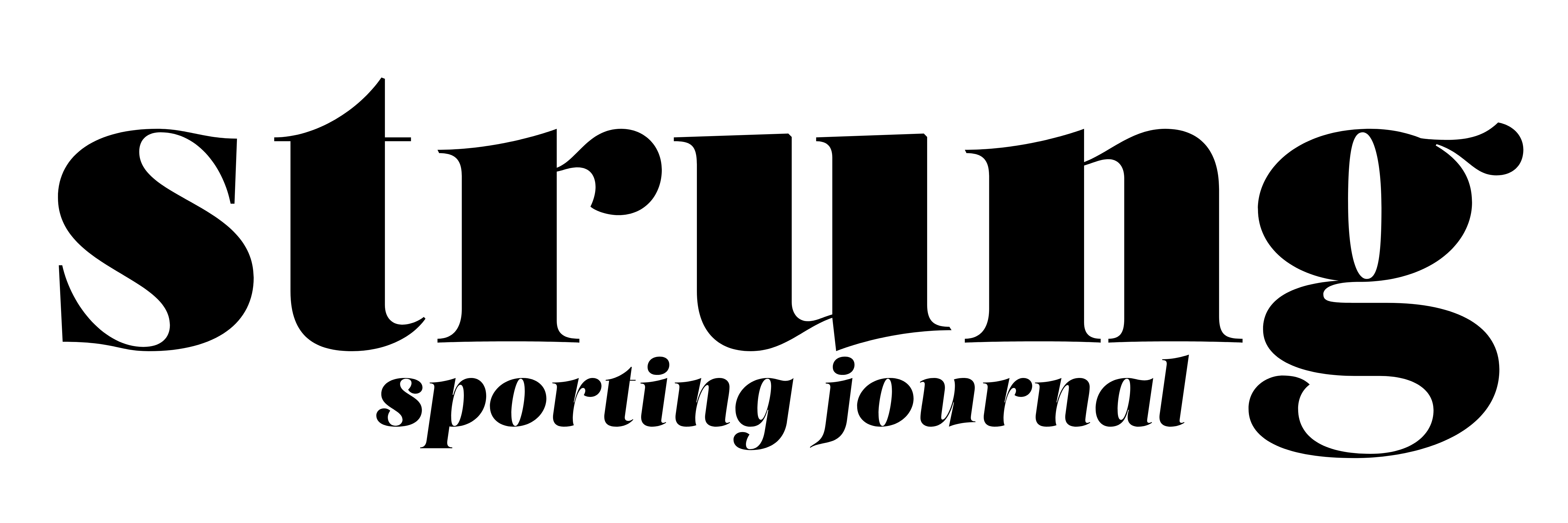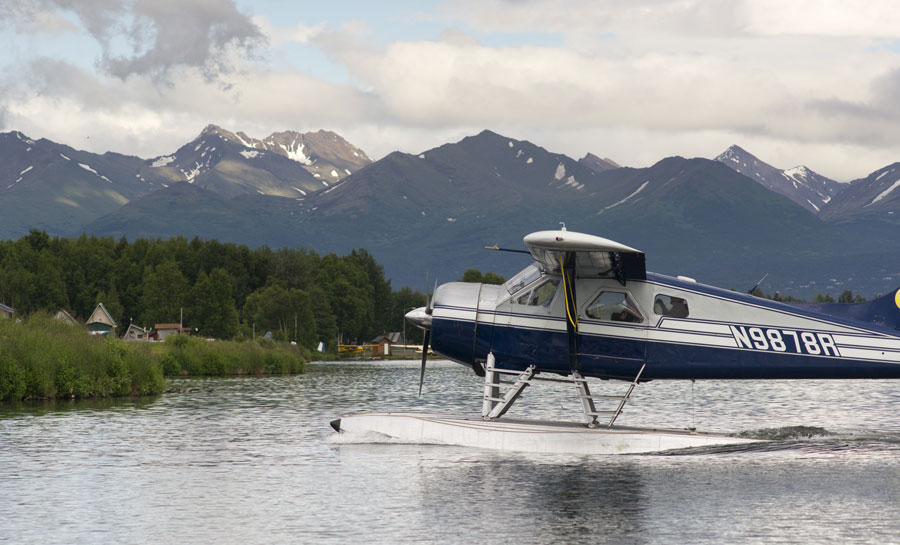In Alaska, I have so many options: I might keep drinking at the bar, or I might walk through the drizzle down to Beluga Lake and watch the float planes struggle off the water. Hobo Jim is playing the Frontier Theater; I could go there. I might rent a surf rod and cast for flounder; or just walk down the Spit and back, stopping here and there to look at the glaciers across the bay; or loiter by the cleaning tables with a society of simpletons, like me, who can stand next to piles of fish guts and smile. There is the scent of rough seas upon the air. And light—always plenty of light—in the theme of landscape artists and paintings of whales. But there is also this enduring thought that all this will soon crash to an end. The weather is turning nasty, with sheets of broken mist scudding down from the cragged heights across Kachemak Bay. Like romance, the busy season is falling apart. I’m always just in time to watch it collapse.
I had been doing this for years, venturing to the Kenai Peninsula in late July to fly fish for salmon or dredge the depths for halibut. Donning rubber boots, walking around the gift shops with my hands plunged in my pockets—not buying but looking for something specific, creeping people out when I arrived unannounced at their beach bonfires. I rented underperforming, mildewed cars and drove the swales of my latest romantic loss: her hips, her long limbs, her wild gaze by Skilak Lake. As I marveled at the aquamarine colors of the glacier-fed rivers—the brilliance and quirk of fireweed—I tried to remember those last conversations. Did she say we didn’t bond, or did she just say she didn’t bond with me? Did she leave it open-ended about us getting back together someday, or did it ring with finality, like the rot of salmon berries on the vine?
Incognito in Alaska, I quickly become a regular at Fat Olives, settling myself at the granite bar, tipping the wide-body waitresses like a profligate. Customers talk about the fish—ones they caught on their half-day charters, and ones that snapped their lines. A bear has been seen on the beach digging for clams—they talk about that, and the minor earthquake that shook them awake in their RVs.
SORE, BORED, OUT OF SORTS?—TRY THAI MASSAGE TODAY MR. SUPERSTAR, reads the sign at the new massage parlor. Its competitor down the road flies red and blue balloons. They specialize in feet.
I didn’t always go solo. I brought women up to the Kenai Peninsula—beautiful, green-eyed women who seemed to need to be reunited with the sea and the glaciers. I was just a facilitator, really, there on the pitching deck of a halibut boat, her hair whiplashing, the rollers building to frightening heights, that same wind gnawing the edges of the vessel and making a daunting wail. We stood amongst the masses slapping weighted flies in the Kenai.
A habit of mine is trying to create enthusiasm where there is none. Winter was on everyone’s mind, even as we queued at the fish-processing plant with our filleted catch in a gray tub, or when we walked in rain around the Spit, drizzle-touched, seagirt, saturated, beer on our breath, caffeinated to the max. I looked over a piece of fossilized walrus tusk that had been carved into a heart. I thought of buying it for her but didn’t. I proclaimed often, and to anybody who would listen, that one day I would live in Alaska. I said it to my mother as a challenge—a dare. I said it to friends who were barely listening. It was one of my dreams, and the problem with dreams is that they ruin you when you solve them, or even if you just come close.
***
 This winter, in Wyoming, I felt as though it was time for me to move on. All the signs were there: the frozen river, the disorganized fly box. Mid-December I was scanning online databases for college teaching jobs when I came upon an ad for a full-time gig in The Last Frontier. Immediately I began to dust off my resume and gather my references; one colleague enthusiastically jumped at the chance to write a letter of recommendation for me. Alaska, he said, is where I ought to be.
This winter, in Wyoming, I felt as though it was time for me to move on. All the signs were there: the frozen river, the disorganized fly box. Mid-December I was scanning online databases for college teaching jobs when I came upon an ad for a full-time gig in The Last Frontier. Immediately I began to dust off my resume and gather my references; one colleague enthusiastically jumped at the chance to write a letter of recommendation for me. Alaska, he said, is where I ought to be.
With this first application came many others. I had to create a profile. My username was dogfish69. I began a daily routine of waking early, checking the web for job announcements while I drank coffee, and walking to work with new ideas about how to sell myself along with all my household items. Washington, Northern California, Oregon—places with ragged coasts and raging tattoo parlors. Steelhead. Bottom fish. A fly shop of reputation. I dreamed of a gigantic garage sale that would set me free. All I wanted to keep were my black Labs and my fly rods. And those two expensive shotguns. But the rest should go.
Things had changed since I won my job years ago. There were far fewer full-time positions. Most announcements asked for online experience: experience teaching distance education. I had been hectoring online teachers for years, sometimes with full knowledge that my audience included some recently awarded PhDs from online degree factories. Now I had to pretend that I was kidding. When I read these announcements, I could tell right away that these schools really valued experience in “asynchronous digital learning,” whatever that meant. And they asked you to write supplemental essays—little jags about how you would contribute to the community, what you thought of dual enrollment. I wondered about the people who wrote these announcements: Did they make love? Did they dream?
Many postings came with chilly phrases such as “part-time,” “temporary,” “term,” or even “dependent upon funding.” There were ads for three-quarter instructors. Various adjunct positions bloomed on every page, positions wherein the institutions wanted everything from you, and in return offered a shared office that overlooked a major highway featuring a predictable ebb and flow of traffic coming from the industrial park, the Texas Roadhouse, and the newly risen IHOP. College presidents, with not the slightest sense of irony, now referred to themselves as CEOs. Sometime during the last decade or so, while I was learning to nymph the chilly North Platte, the academic landscape went to hell, and I never noticed. “Must be able to sit for up to eight hours in a semi-quiet environment/ must be able to lift up to 50 pounds/ must embrace local business trends,” read one ad.
Alaska called in February. It was actually the Director of HR who called. She arranged a phone interview for the following week. I did my best to prepare by scouring their website. I practiced my answers in my head as I walked my dog around the snow-beaten city park. I asked him, “Want to go to Alaska?” and he perked up and tilted his head. But he did this for any question.
Preparing for the interview, I told myself not to mention fly fishing too much. Otherwise I’d come off as one of those trout bums you come across in Montana and Idaho: a permanently sunburned guy with $8,000 in gear and no intimate relationships of which to speak. I started looking at houses in Alaska via the internet. In my mind, I was already gone.
Despite my efforts, I bombed the phone interview. Someone had told me to smile while answering the questions, but it felt ridiculous—more like I was sneering. I was in my office, alone, breathless as I was introduced to the panel, the scratch and static of so many wintry miles between us. Many of the questions were about online teaching. I had avoided teaching online since a terrible composition class in the spring of ‘09, in which half the students dropped and the other half threatened mutiny when I insisted they discuss Black Elk Speaks. The interviewers asked me what I knew about their institution. In truth, between sessions on the Kenai, I had stopped by there one summer and looked around, swatting mosquitoes that seeped up from the soggy college grounds. But I didn’t share that.
I thought it was a wash, that I would never fulfill my long-held dream to live in Alaska. And yet I received a call two weeks later inviting me up for an interview. This was March 5, and the interview would not take place until April 19. I wondered what they were hiding. Perhaps they wanted me to see it in April, when the rivers break up and the willows begin to bud, when the ravens grok from barren trees. When the reality show film crews are in the bars getting their sea legs.
 Mid-April, I flew out of Wyoming in a blizzard. I brought my 6-weight and a box of sculpin patterns just in case there was time to fish. Eleven hours later, I watched glaciers sail beneath the aircraft as we descended into Anchorage. I was at my hotel in time to drop my bags and go out for dinner. It was bright outside, almost too much to handle without dark shades. Anonymous and jet-shocked, I ate wild king salmon at a small bar where a guitarist with a white beard played passable Buddy Guy tunes to an audience of five. I saved the receipt with the idea of being reimbursed.
Mid-April, I flew out of Wyoming in a blizzard. I brought my 6-weight and a box of sculpin patterns just in case there was time to fish. Eleven hours later, I watched glaciers sail beneath the aircraft as we descended into Anchorage. I was at my hotel in time to drop my bags and go out for dinner. It was bright outside, almost too much to handle without dark shades. Anonymous and jet-shocked, I ate wild king salmon at a small bar where a guitarist with a white beard played passable Buddy Guy tunes to an audience of five. I saved the receipt with the idea of being reimbursed.
Electricians were rewiring the hotel where I was staying—the Gold Rush—and early the next morning, I heard them crawling in the ceilings and walls like packrats. The whole hotel was undergoing a makeover to prepare for the summer fishing season, the sockeye run that people discussed in hushed, semi-religious tones. The mighty Kenai River was right there, within spitting distance, but so low that I hardly recognized it. The aquamarine color was missing because it was the dead of winter. There were blocks of ice the size of buses stacked against a tiny island.
Soldotna had moldered since I last saw it, three years back. Kenai seemed unredeemable, decaying. Many stores were boarded up for winter. There were tiny coffee kiosks steaming in the sunshine. There were two newish Thai massage parlors, painted in neon and flying foil balloons. The Safeway looked shipwrecked, the parking lot shelled with potholes. The realtor took me to a quaint coffee shop by the mouth of the Kenai, and we drank beautiful coffee and watched a few blocks of ice tumble out of the Kenai and into Cook Inlet. The mudflats were latticed with runnels of melt. WAKE FOR SPRINGTIME MR., read the sign at the massage parlor. YOU OWE YOURSELF SUPERSTAR TREATMENT. I wish I could wake, I thought, superstar or not.
At dinner with the hiring committee, I ordered a local beer. It was a sloppy move. But several of the committee members came to my rescue and ordered beer, too. We were at the same place I had stumbled into the night before: same guitarist, same waitress, same salmon. Everyone else ordered chicken and beef. “I can’t eat another bite of salmon this winter,” said the sociologist. “I have to trick my kids into eating it.”
The next morning I killed the interview. I was deferential and prepared. I used all the tricks: PowerPoint, handouts, Langston Hughes, and a sizzling, self-deprecating humor. I felt even better about them as we got to know one another. In the afternoon the Department Chair sprang for coffee, and I was set free after a brief interview with HR, wherein she refused to talk specifically about anything. Instead, she gave me a handful of pamphlets describing local fishing and hunting outfitters: Goodtime Charley’s, Catch-a-Lot Charters, Kenai River Run Outfitters. She said that the college contributed seven percent to retirement.
“But if I don’t know the salary, I have no idea what seven percent is,” I countered.
She frowned.
I had two days to drive around Alaska and see if the place really was for me. Eschewing the massage parlors, I chatted with my countrymen at the Safeway about the staggering price of milk and oranges. I drove up the Kenai and looked back at the Chugach Mountains and wondered if those mountains and I could get along. I wondered if there were any gamebirds around for Henry to chase. I read up on ptarmigan. I parked near Skilak Lake and walked along the cobbles near the river. No one was fishing. I didn’t even take my rod from the case. Old and odd bits of tackle decorated the roots of fallen trees. I found a coho fly: simple with only some silver foil and a few strands of green bucktail. I freed it from the snag and put it in my visor.
I settled in at one of the microbreweries and ordered a pale ale. The waitress was shockingly beautiful. She had some sort of duck feather hanging from a gold post impaled through her ear. I noticed several other men at the granite-topped bar. In fact, there were only men at the bar. All were about 10 years younger than me, wore hats and goatees, and were in shape with slightly wind-burned, Irish faces. They were pilots waiting for the fishing/bear-viewing season. They were game wardens and wilderness firefighters. They were glacier climbers. There was even a wildlife biologist who darted and collared Dall’s sheep. His neck was ram-thick and he drank porters and slapped the bar when someone made a joke. One guy owned a six-pack fishing boat wherein he trolled for king salmon and halibut on Cook Inlet. They bought rounds for each other, though it was apparent they were rivals. One guy, who wasn’t talking, worked with scissors and feathers, tying a streamer at the bar.
 The boat captain said, “I took Amy,” and motioned with his chin to the beautiful waitress, “and she caught one that went nearly 150 pounds.” Amy smiled.
The boat captain said, “I took Amy,” and motioned with his chin to the beautiful waitress, “and she caught one that went nearly 150 pounds.” Amy smiled.
It turned out that Amy went on many adventures that past summer, camping in the Brooks Range with one of the pilots, tagging fish with the game warden. Other things too: prolonged campouts, long reflective trips into the backcountry with various beautiful and well-armed male models. Amy, a pilot herself, dabbled in guiding and selling art she crafted out of antlers, shells, and skulls. I could only envy their vibrant and free sex lives. Suddenly I thought: You’ll never have sex again if you move here. I would become irrelevant the day I arrived.
Still, I was willing to risk it; we had been at this together for so long, Alaska and I. It seemed a pity to throw it all away. As I was about to leave, the quiet fellow finished tying a stately fly on a number two hook, with peacock feathers and jungle cock tied into the collar. He placed it on the rim of his empty glass and left it for Amy as a tip. She swooned when he walked out. I walked out too, the April sunlight shocking me to stupidity. I was grinning for some reason.
I woke up the next morning to the soft voices of electricians. They were in the walls and the ceilings again. Little flakes of insulation snowed down upon my bed. I walked out to the Kenai and threw some stones. I couldn’t get any to skip. A pair of mergansers were dipping in a back eddy, terrorizing salmon smolts, eating some whole and maiming others. I didn’t know my future, and it drove me mad. I had no way of knowing I’d fly back to Wyoming, flush, smelling of massage oil, but hopeful about my future. I had no idea I’d surprise even myself and turn away from my most enduring fantasy.
From then on I received one call after another from colleges proposing to me: a two-year in Reno, a sprawling tech school in Saint Paul. I bought my own airfare and saved piles of receipts. Then I’d do the unpardonable: I’d begin to think I had options. I’d indulge myself with online real estate searches. Can you imagine a guy with an MFA in poetry thinking he had options? There would be a call from Eureka, California, and I’d put on the Beach Boys and try to imagine myself sitting at the base of a dune, Henry and Rocket chasing seagulls. My pockets bulging with receipts, I’d indulge myself in beautiful scenarios; and I have to admit it, I would be happy for a while, believing I could leave Wyoming on my own terms.
***
 I got an offer from the college in Alaska: $55,000 and all-you-can-eat red salmon. My contract was a three-year term. I would lose lots of sleep but eventually turn the offer down, citing something about being too far away from my family, or the salary being too low—preferring to remain part-time, uninterested viceroy of early-ending classes, Visiting Professor to my own life, adjunct to the universe of stars and man camps out on the vast plains of sage. I can’t remember exactly why I turned it down.
I got an offer from the college in Alaska: $55,000 and all-you-can-eat red salmon. My contract was a three-year term. I would lose lots of sleep but eventually turn the offer down, citing something about being too far away from my family, or the salary being too low—preferring to remain part-time, uninterested viceroy of early-ending classes, Visiting Professor to my own life, adjunct to the universe of stars and man camps out on the vast plains of sage. I can’t remember exactly why I turned it down.
But I am too far ahead of the story. I still had a day to kill in Alaska.
I toured the Kenai Peninsula, the rental car humming, fishing pamphlets splayed all over the dash. I was incredibly bored and unusually hungry. Perhaps you saw me there in the hardware store: I was the one philosophically fondling various pliers and fillet knives. I bought cans of smoked silver salmon. I stopped into the Game and Fish office and talked to the woman dressed in a brown uniform about hunting and fishing. I complimented the taxidermy on the walls: the five species of Pacific salmon, the disinterested brown bear, the humdrum caribou, and the moose—and the other moose, too. I went to the visitor center to see the world-record Chinook salmon mount—97 pounds, four ounces—caught by Les Anderson of Soldotna in 1985. Then, as the day came to a close, I began to get jittery about the flight home. I wandered into a Thai massage parlor. There was a fish tank swarming with ravenous tropical minnows whose job it was to eat the dead skin off your feet. I was fitted into a fluffy white robe that smelled of bleach and mangos. Hot tea was offered. I was directed into a darkened room where a boombox played soft foreign music. A tiny, beautiful woman kneaded my back with her knees and talked in my ear about how busy the season would be in a few months, when the salmon came back. She said she’d make all her mortgage money in just a few weeks. There would be bumper-to-bumper traffic, she said—groups of men stumbling from the bars to the river and back to their hotels, all because of the salmon.
“Mister, you have to be here to believe,” she said.
I laid there fatly in my boxers while she insisted I was a superstar. I didn’t argue. She had me flip over so she could do my flanks. I began to worry that I was breaking the law just by being there. She told me to chill. Her body rolling over mine with a light dressing of oil between us made me think about the glaciers all around us. Except they had been at it forever, the glaciers and the rock beneath them. I was just an interloper.
My time ran out. I put the receipt in my pocket and headed out into the light.
 READ STRUNG MAGAZINE – SUBSCRIBE TODAY
READ STRUNG MAGAZINE – SUBSCRIBE TODAY




